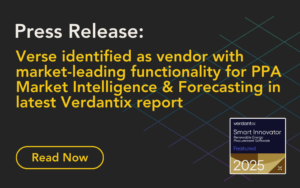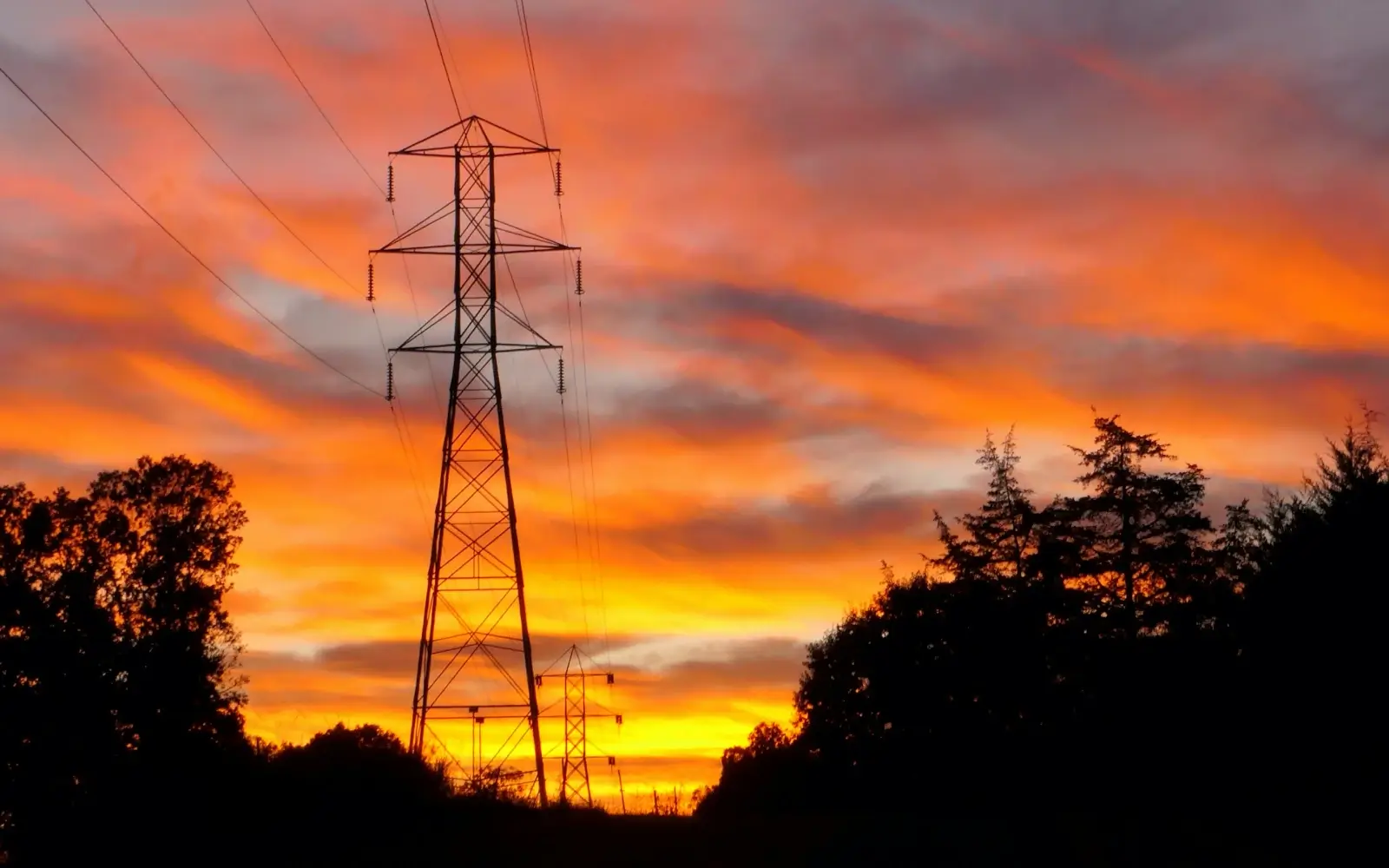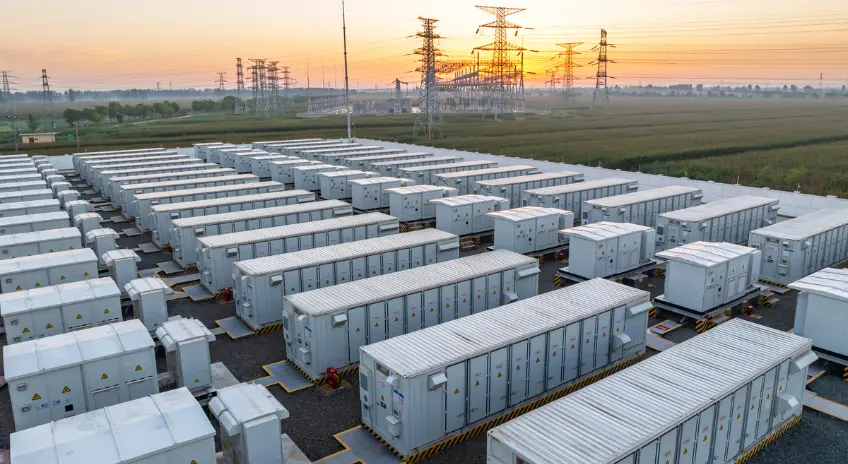You worked hard to negotiate your PPA. But once the deal is live, a new set of questions starts to surface. Is the asset actually...
AI and Energy: A Virtuous Cycle

At Verse, we imagine a world where AI and energy evolve in tandem, producing a virtuous cycle.
AI’s Significant Energy Requirements
Industry fervor around artificial intelligence (AI) reached a new crescendo last year as transformer architectures for generative applications became mainstream. In terms of energy consumption, these applications are not cheap. Some researchers project that by 2027, AI workloads may consume anywhere between 85 and 134 terawatt hours (TWh) of electricity each year – roughly 0.5% of global electricity usage (about as much consumed by the entire country of Argentina).
Meanwhile, electricity infrastructure in many nations is undergoing a significant transformation as wind and solar power resources become cheaper and more abundant, reaching over 1 terawatt of installed capacity worldwide. However, with global annual energy use over 1 exawatt hours (1 million TWh), we would need a 116x growth in renewable installed capacity just to reach parity across all energy consumers today.
This will be a daunting task, but we believe AI and energy do not have to be mutually exclusive. There are two trends in AI that we believe will converge to close the clean energy gap: (1) more energy-efficient computing chips for AI workloads, and (2) more powerful AI to accelerate the world’s transition to sustainable energy.
Large Energy Users and Agents of Change
Most AI software runs on Graphics Processing Units (GPUs) that execute model training and inference computations orders of magnitude faster than typical CPUs. As much as 95% of the market for GPU chips is supplied by one company: Nvidia. Their most hotly demanded chip, the A100, is powerful but energy-hungry, performing up to 312 trillion floating point operations per second (TOPS) while consuming 400 watts. Other application-specific hardware solutions, like Google’s Tensor Processing Unit (TPU) chips, consume 38% less power but with 2.24x more TOPS.
Google’s TPUs are thus 3.6x more energy efficient, and more energy efficiency means less carbon emissions than Nvidia’s GPUs. Furthermore, Google’s recently announced Gemini family of generative transformer products (which run on Google TPU supercomputers), combined with the company’s transparency around energy use and carbon emissions in its data centers speaks to a commitment we hope other technology companies will adopt to reduce the energy intensity of all AI workloads and data centers.
Legacy chip companies like AMD and Intel as well as nearly a dozen (and growing) other semiconductor startups will compete against Nvidia’s incumbency to build more energy efficient substrates for artificial neural network computations. To unlock the benefits of these more efficient chips, software teams will need to build new drivers for these next-generation hardware solutions (it took one startup two years just to switch from Nvidia’s CUDA toolkit to their own drivers). Innovations in AI hardware and software that reduce our carbon footprint will be essential to our global sustainable energy transition, as many of the companies building these technologies are also driving substantial progress in procuring sustainable energy sources for their internet businesses.
AI and Energy: Accelerating Clean Energy Adoption
Innovation cycles in AI should, in turn, accelerate the development of clean energy projects and purchases. That is why we believe carbon-free energy and AI will evolve together in a virtuous cycle. We are walking this walk with our products, directly embedding generative AI solutions that provide customers with unique insights into their clean power portfolios to guide their decarbonization strategies. Buying clean power is not easy, which is why only four megacap corporations (Amazon, Microsoft, Meta, and Google) were responsible for more than 50% of all corporate clean energy Power Purchase Agreements (PPAs) in 2021.
We envision a world where AI simplifies the valuation, solicitation, planning, purchasing, and management of carbon-free energy projects for any organization seeking to diversify and optimize its power supply portfolio. AI can improve every stage of corporate and industrial (C&I) clean energy adoption:
- Goal Setting and Planning: Planning for incremental resources procurements in line with sustainability goals requires bespoke linear and integer programming techniques. Risk and uncertainty are everywhere (in PPA prices, market prices, regulatory changes, and basis and shape risk, among many other areas), so helping customers create and manage clean energy portfolios that stay in the money long-term requires unique analysis and expertise.
- Valuation: Carbon-free energy project valuations often entail complex spending calculations with predictive electric grid models across a range of probability windows.
- Transaction: Solicitations for power projects through Request For Offers (RFOs) is presently a manual process that could one day be streamlined, standardized, and automated. Furthermore, purchasing power from developers often cannot proceed without parsing hundreds of pages of utility and operator tariffs to fully understand all of the costs of permitting, building, operating, interconnecting, and delivering clean energy projects.
The domain-adapted AI assistants and agents that we are building will be indispensable to lowering the barriers to entry for smaller organizations seeking access to clean energy. And as the grid mix diversifies, precise and reliable dispatch of intermittent clean energy supplies with batteries will be achieved with AI-powered model-predictive control.
A Responsible and Sustainable AI and Energy Future
There will be threats to this vision along the way, some of which will be propelled by the same AI technologies we embrace. AI may be used by bad actors with unparalleled asymmetry to increase extraction of fossil fuel products, to enhance deforestation operations, to attack critical cyber-physical grid systems, to sow disinformation about clean energy policies during crucial election seasons, or against regulatory agencies tasked with protecting citizens from the harms of industrial pollutants. We must all be vigilant against these potential threats while combining AI and energy — putting the power of AI toward building a more sustainable future.
Verse is dedicated to building a world-class product that leverages our in-house technical expertise for the benefit of organizations everywhere. Our survival and economic prosperity depend on an outcome where carbon-free energy and AI advancing in harmony form the bedrock of a sustainable future for all.




